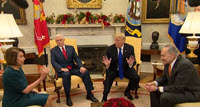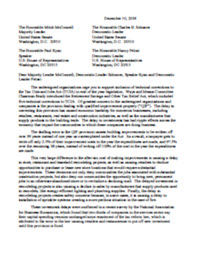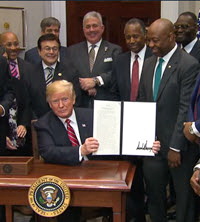The federal government will partially shutdown unless Washington policymakers can pass a year-end funding bill by Dec. 21. Negotiations over a spending measure have deadlocked over President Trump's request of at least $5 billion for construction of a wall on the Mexican border versus Democrats' offer of approximately $1.3 billion for border security. (The Hill, Dec. 13)
 |
A meeting between President Trump and Democratic leaders this week resulted in sharp disagreements over funding for a border wall. (Wall Street Journal, Dec. 11) |
Prospects for Revised Tax Bill in Doubt; Roundtable, Stakeholders Push for Technical Correction to Depreciation Rules
 |
The Roundtable on Dec. 10, 2018 joined more than 260 stakeholders in a letter to congressional leadership urging a correction of the qualified improvement property (QIP) provision. |
If Congress does not pass tax legislation by year-end, the incoming Chairman of the House Ways and Means Committee stated that tax extenders will be a priority in the next Congress. Ranking minority member Richard Neal (D-MA) referred to retroactive renewal of more than 20 extenders when he told Tax Notes on Dec. 12, "We'll have to wait and see [how many are considered], but we certainly intend to move on them fast."
President Trump on Dec. 12 signed an Executive Order that seeks to facilitate long-term equity investment in new Opportunity Zones and other low-income communities. The order formally established the White House Opportunity and Revitalization Council. (White House statement and PBS Video, Dec. 12)
 |
President Trump on Dec. 12 signed an Executive Order that seeks to facilitate long-term equity investment in new Opportunity Zones and other low-income communities. (White House statement and PBS Video) |
Second Round of Opportunity Zone Regulations Expected in January
 |
The next round of Opportunity Zone regulations may be released in January, according to Treasury Assistant Secretary for Tax Policy David Kautter, above. (Tax Notes, Dec. 14). |
The Roundtable's Tax Policy Advisory Committee (TPAC) recently convened a panel on Opportunity Zones that included the tax counsel for Senator Tim Scott (R-SC). TPAC's Opportunity Zone Working Group is developing additional comments on how the industry can help the program fulfill its ambitious objective of stimulating economic development and job creation in low-income communities. (Roundtable Comment Letter, June 28 and Roundtable Weekly, July 20)